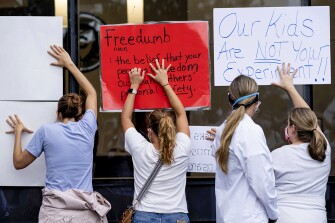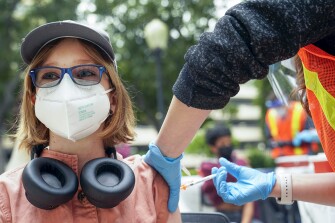Crisis, turbulence, and uncertainty are the new normal for school leaders navigating a pandemic, racial justice protests, and the politicization of issues as disparate as critical race theory and school masking policies.
But if and when the dust settles, are there lessons for principals to learn to sharpen their leadership skills for the next unknown crisis? The short answer, according to principals interviewed by Education Week, is: of course. Crisis can serve as a form of real-world professional development. The tricky part is cultivating the habits and mindset to learn the lessons those experiences bring and apply them in the future.
EdWeek narrowed the advice of these principals—who come from across the country—down to five ways for school leaders to take advantage of the lessons left by challenges.
1. Get feedback
School leaders shouldn’t rely solely on their own perspective when determining what worked and what didn’t in response to a crisis or challenge.
Feedback from the community can help principals crystallize important takeaways. What were the pros and cons of a particular action or policy?
“See what things can be moved forward, and what things can be left behind,” said Jonathan Saiz, the principal of Governor Bent Elementary in Albuquerque, N.M.
For this exercise to be meaningful, it’s important to gather perspective from many different groups, said Saiz.
“Just hearing from every person you can hear from before a huge initiative is implemented at the school,” he said. “How will it impact all these stakeholders directly? How is it going to affect the families? It can be from a community event all the way to a homework policy.”
That includes listening to students as much as adults, he added.
But getting honest feedback isn’t as simple as it sounds and requires laying some groundwork.
Building trust is key, and one way to do that is through strengthening relationships with families, which Saiz did during the pandemic by increasing the number of home visits he conducted.
Another way to get honest feedback is by showing vulnerability, said Manuela Haberer, the principal of Murray E. Boone Elementary in San Antonio. It’s something she is conscientious about doing with her teachers, she said.
“Because then you become relatable and they are able to more openly share with you what they are concerned about and what’s keeping them from performing their best,” she said. “When you tell them, ‘This is scary for me as well, but this is what we’re going to do, and we’re going to do it together, and we’re going to get through it together,’ you’re going to build trust.”
But to give meaningful feedback, people also need to be in the know, which requires thoughtful and frequent communication, said Haberer.
Prior to the pandemic, she used to send a weekly bulletin with school news and important dates and reminders. But once COVID-19 hit, directives and advice from the state and health officials were changing so quickly she started sending the bulletin daily to keep her staff in the loop as much as possible.
Having multiple avenues to share feedback with leadership is also important, said Kerensa Wing, the principal of Collins Hill High School, located outside Atlanta. To collect student feedback, she holds town halls, conducts regular surveys, and has standing meetings with several student leadership groups.

2. Focus on what you can control
For Trevor Goertzen, the principal of Spring Hill Middle School located just outside Kansas City, Kansas, an important part of developing the mindset to learn from failure or challenges is being deliberate in making head space to reflect on those difficulties.
That means making sure that he doesn’t dwell on minutiae and negativity, or he’ll miss the lessons that can be gleaned from a particular challenge.
“I have no control over the political climate, I have no control over the junk that goes on social media, the homes my students come from, but I have control over what I give head space to,” Goertzen said. “If I am constantly worried about every little thing, I am going to be a negative person.”
Admittedly, it can be hard not to become consumed with worrying about every little thing, especially, said Goertzen, at a time when principals are substitute teaching, serving lunches, and taking on custodial tasks on top of their regular duties because of labor shortages.
But cultivating that self-awareness—and keying into his inner dialogue—helps Goertzen home in on what lessons he can take away from a challenge.
“I have become a big believer that the thoughts we have will drive our actions,” he said. “If you let that be negative, and let the crisis be the thing that controls your thoughts ... you’re not going to be in a good place.”
3. Don’t forget the main goal
Sorting through the fallout after a crisis or turbulent time can be overwhelming.
But Goertzen said that keeping his highest priority in mind—educating kids—helps focus his mind and prime it to learn from the crisis at hand.
“If you keep that priority, positive relationships with kids and educating kids the driving focus ... I feel like that’s something I don’t have complete control of as a principal, but I have a lot of influence over it,” Goertzen said.
That has also been the guiding star for Haberer and her staff. “Like most educators, we’re here because we love to see the students thrive and we love to see students progressing academically and socially,” said Haberer.
It has been difficult for her staff as their students have struggled academically after a long period of remote learning and navigating job loss and death in their families.
“We’re blessed with having two regular counselors, plus a program called Communities in Schools provides a third counselor that really helps families with those social and economic problems,” said Haberer. “So, we can get the kids here at school, get the academic interventions that are needed and ... more of a school routine. That, as a school staff, has been our focus.”

4. Lean on professional communities or networks
Formal or informal groups of peers can provide an important avenue for reflecting on what can be learned from a crisis and brainstorming ways to apply those lessons to the next big challenge.
“Yes, I think principal networks are critically important,” said Wing. In her district, Gwinnett County Public Schools, principals of the district’s more than 20 high schools meet at least monthly. She said that, and attending conferences hosted by the National Association of Secondary School Principals, has helped her build a robust network of peers she can call upon to troubleshoot problems and learn from them.
“The principal’s job is unique in the building ... You need support as well as to be able to bounce ideas off of somebody,” Wing said. “In your building, sometimes when you say something everybody takes it as that’s what’s going to happen. But when you’re talking with another [principal] it’s easier to really do some brainstorming.”
Just as these opportunities are important for principals, it’s equally crucial that school leaders give their teachers and other staff the chance to collaborate and learn from challenges.
Haberer said she learned the importance of collaboration through her first career as a physical therapist, which required her to work closely with nurses, doctors, and the occupational therapist to care for patients.
She said while some schools put professional learning communities on pause to give teachers extra time to plan, she took the opposite tack because it gave educators an avenue to work through problems together and hopefully grow professionally from it.
“Nothing will build a team up more than being together in a struggle,” she said.
5. Prioritize self-care
It’s been said a million times throughout the pandemic: You must put on your own oxygen mask before you can assist others with theirs. This analogy to an in-flight emergency is used to argue for the importance of self-care. Principals can’t adequately support their students and staff if they are completely depleted themselves.
But self-care is necessary for another reason, said Wing. Having the space to reflect on a turbulent time is key to unlocking the lessons from a particular challenge, which is why time away from meetings and the daily churn is so important.
“It gives you quiet time to organize your thoughts and think through things,” she said. “One of my favorite activities is to go hiking because no one is talking to me, and no one can get ahold of me.”
Wing said if she could give two pieces of advice to other principals it would be to connect with their peers and make time for self-care.

What they learned....
As far as what these principals learned during the past year and a half, the lessons were as varied as the communities they come from.
Wing said that the racial equity protests following the death of George Floyd were a turning point for her in realizing she needed to take a more data-driven approach to rooting out inequities in her high school.
She and her staff now meet frequently to comb over data on student discipline, attendance, Advanced Placement enrollment, and performance on AP tests for feedback on how students from different demographic groups are doing.
And while Wing said her faculty members couldn’t be more done with teaching over Zoom, they all realized it could be a powerful tool for making after-school tutoring more accessible to students who don’t have transportation.
The primary lesson Haberer took away from the pandemic was the need for constant communication through a crisis. She is keeping her daily bulletins because when there’s a lack of communication, negativity fills the void, she said, citing a quote she had read from leadership expert and author Jon Gordan.
Goertzen said the biggest lesson for him was how focusing on the main goal, educating children, can serve as an anchor for a school leader facing crisis.
Finally, for Saiz, the pandemic brought home how vital a school is to the broader community.
“A lot of times, in a school building, we are doing our work ... and we forget to pick up our heads and see, wow, this is the impact we’re making,” he said. “That was my ‘aha’ moment.”
“Knowing that our work has a ripple effect, and knowing that whatever initiative is implemented in school, how it is affecting ... the community,” he said. Prime example: “Schools closing ... had a huge impact.”






